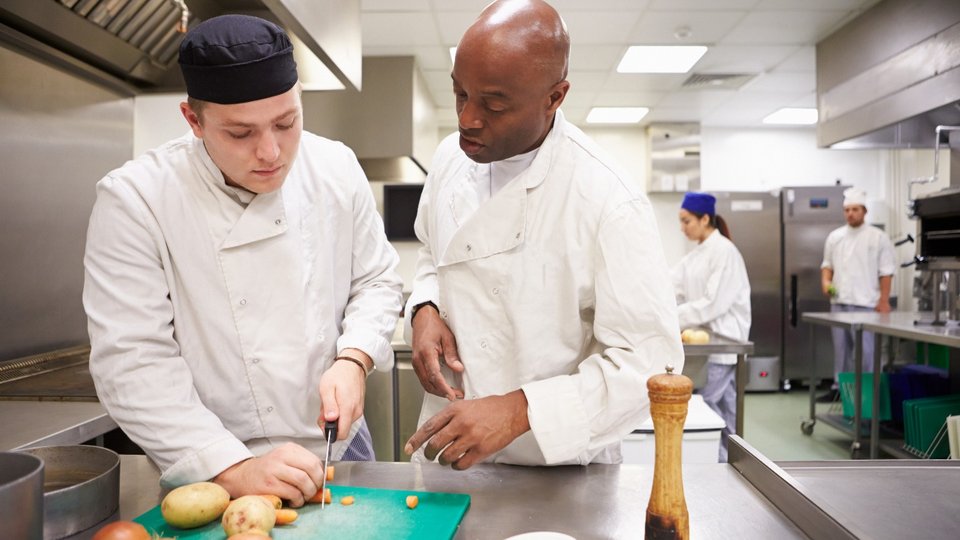Operations
5 key training mistakes and how to improve them
In the fast-paced world of QSRs, where the quality of service can make or break a business, effective team member training is essential. These five training tips can help your QSR thrive.

September 13, 2024 by John Meyers — COO, Marco's Pizza
In the fast-paced world of QSRs, where the quality of service can make or break a business, effective team member training is essential. Whether you're a seasoned restaurateur or new to the industry, even the most well-intended training programs may have operational inefficiencies. By removing blinders and confronting common errors, you not only enhance team performance, but ultimately, contribute to overall brand success.
As the COO of Marco's Pizza, I've put an emphasis on our team training in each restaurant in order to help educate, empower, and grow our team members. This article explores some of the key training mistakes and how to improve them.
Collectively this will help improve one of the greatest challenges of running a restaurant – employee retention.
The restaurant industry has been plagued with an average annual turnover rate of 79.6% over the last 10 years. Despite the high percentage of employees that leave, for a variety of reasons, consumers are not slowing down with their demand when it comes to eating out.
In order to meet this demand, 45% of restaurant operators said they are in need of more employees to provide the quality of service required for the high traffic. As new employees get hired to serve the high demand of guests, employers can focus on retention from the first day of employee onboarding through the training process and beyond.
Here are five common training mistakes that restaurants often make and actionable strategies to help address these pitfalls:
Failing to empower employees
Neglecting to give employees the autonomy and authority to make decisions and act can stifle their confidence and limit their ability to provide exceptional service.
My career began in the QSR space in operations, and throughout my time in the industry, I have seen firsthand the importance of empowering team members. This is an idea that should begin during the hiring process and carry on during the employee's time with the business.
To avoid this pitfall, restaurants need to invest in training that encourages problem-solving and decision-making. Situational empowerment training helps grow remarkable teams through remarkable experiences. This includes setting clear boundaries and guidelines within which team members can operate autonomously. Additionally, recognizing and rewarding team members when they make good decisions reinforces the behavior you want to see.
Remember, empowerment involves more than just assigning tasks – it's about trusting team members with decision-making power and giving them the confidence to act in the best interest of the customer and the business.
Utilizing outdated training methods
Gone are the days of static presentations and instructional videos being the silver bullet to effective training. QSR brands must evolve to experiential-based training platforms that engage team members in dynamic ways.
While providing an employee handbook is still a crucial piece to the training process, it does not stop there. To modernize training methods, consider incorporating interactive simulations, role-playing exercises, and other hands-on activities to help team members work through a variety of scenarios they may experience during their shift.
This provides team members the confidence they need to succeed in their role.
Keeping brand values at a distance
The core values of your brand are there for a reason. They represent what the company was founded upon and how it should be led, which includes your front-line staff. However, a common pitfall is treating these values as mere brand mantras rather than finding ways to integrate them into daily operations.
When core values are not actively demonstrated and reinforced, they can become meaningless to employees – ultimately, resulting in a disconnect between the brand's mission and actual behavior of team members.
During the interview process, ensure that potential candidates match the same core values as your brand. Once hired, emphasize these core values to the new team member during the training process. Be sure to consistently model these values from the top down and provide specific examples of how they translate to specific behaviors and decisions at the store level.
When team members truly understand and embody the core values, they are more likely to deliver a cohesive and authentic customer experience.
Lack of standardized procedures
Inconsistent service is a major issue among QSR franchise brands, and, many times, it stems from a lack of standardized procedures. A lack of uniformity can lead to varied customer experiences. Overtime, this inconsistency can wear away at customer trust and loyalty.
Standardized procedures provide a clear roadmap for team members. During training, be sure there is an understanding of business operations, and, more importantly, their role in the operation. By having defined procedures, team members can clearly follow through on their work to ensure the best guest experience.
Creating a system-like approach avoids a loose operation. It ultimately sets your team members and business up for success.
Neglecting ongoing training
Training should not be limited to a timeline or set period. Working a job is about constant development and growth, meaning that training should be ongoing no matter how long a team member has been working for your restaurant.
While an employee learns the basics about a brand early in the process, restaurants are constantly innovating and adapting to grow in the market. This means that team members must also continue to learn new technology, new menu items, and new processes to help run more efficiently.
To implement continuous training effectively, schedule regular training sessions, workshops, and refresher courses. These can be supplemented with online learning modules, mentorship programs, or cross-training opportunities to keep team members engaged and motivated.
Retaining team members relies on a variety of factors, and while you can't control them all, you can control an effective training process. By addressing these common pitfalls, you can help ensure your restaurant locations operate at their best, providing a consistently excellent experience for all guests.
About John Meyers
John Meyers joined Marcos in January 2020 and currently serves as our Chief Operating Officer. In this role, he leads the FP&A, Marketing Analytics, Operations Analytics and Business Intelligence team. Meyers is passionate about finding ways to leverage insights that drive sales and profitability for the system. Meyers has a Bachelors in Economics from Eastern Illinois University and an MBA from the University of Florida.









